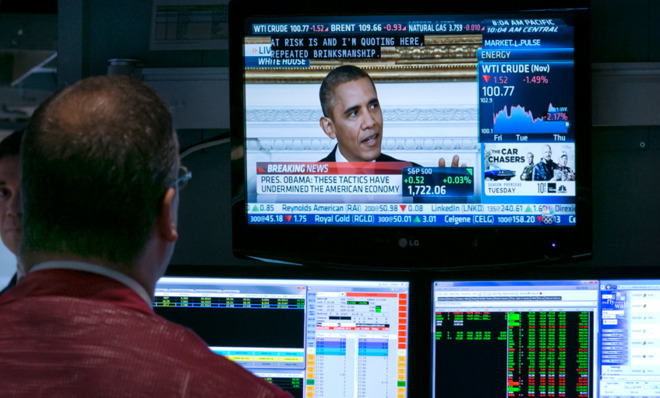Has Washington won its war against Wall Street?
The Dodd-Frank Act forced banks to sell off many of their classic "Wall Street" businesses. How are the banks doing?

A free daily email with the biggest news stories of the day – and the best features from TheWeek.com
You are now subscribed
Your newsletter sign-up was successful
The war on Wall Street is over, "and Washington won in a blowout," said Ben White at Politico. The Dodd-Frank Act has forced banks like Citigroup and Bank of America to sell off "many of their classic 'Wall Street' businesses, including proprietary trading desks and private equity and hedge fund stakes." Goldman Sachs has become "a shell of its former self," and JPMorgan Chase, "once viewed as the only bank to come through the crisis largely unchanged," has had to fork over some $20 billion in settlements "for its sins." While "none of these banks are going broke anytime soon," Washington's regulations are forcing them to cut costs and slash bonuses. Bank reformers may not yet be satisfied, but "Wall Street is struggling to make money."
That's just what they want you think, said Michael Hiltzik at the Los Angeles Times. "The truth is that the financial sector still wields excessive control over the economy, the big players have grown even bigger, and the regulators have been systematically emasculated." JPMorgan's profit — $17.9 billion for 2013 — may be down 16 percent from 2012, but that's "still, shall we say, copious." And making banks pay billions in penalties for bad behavior "is the antithesis of effective regulation: It leaves the wrongdoers in place, primed to find new markets to game." Let's not be naïve: Today's regulations appear successful only because the banks' former playground of mortgage securitization has "been played out." The real question is whether the new rules can "prevent a recurrence in a different market." Don't bet on it. The regulator "cats are always a few steps behind the Wall Street mice."
There are grounds for suspicion, said Matthew Yglesias at Slate. After years of fighting against new regulations, "the financial services lobby has suddenly started proclaiming that Dodd-Frank is working great." They say that only because they're worried about what could be next: A cap on bank size, stricter capital requirements, or even criminal indictments. And it makes sense to worry about banks finding ways to undermine Dodd-Frank or Congress badly underfunding the regulatory agencies. "But it's simply not the case that nothing's been done or that nothing has changed." Even as they hope to stave off more legislation, there's a reason banks have "worked so hard to block, stall, and undo the legislation that's already passed."
The Week
Escape your echo chamber. Get the facts behind the news, plus analysis from multiple perspectives.

Sign up for The Week's Free Newsletters
From our morning news briefing to a weekly Good News Newsletter, get the best of The Week delivered directly to your inbox.
From our morning news briefing to a weekly Good News Newsletter, get the best of The Week delivered directly to your inbox.
Yet regulation hasn't really mattered much as the big banks emerge "from the wreckage of the financial crisis," said Dan Fitzpatrick and Michael Rapoport at The Wall Street Journal. The collective profits of the six largest U.S. banks last year approached those of 2006, when the U.S. was still in "a torrid economic expansion." Even after trimming costs, the big banks are generating record revenues with less reliance on risky mortgage lending. They've been able to release billions from their reserves because "fewer U.S. borrowers default," and that money "goes straight to the bottom line." The good numbers have less to do with regulation, in fact, than with "a healthier U.S. economy."
A free daily email with the biggest news stories of the day – and the best features from TheWeek.com
Sergio Hernandez is business editor of The Week's print edition. He has previously worked for The Daily, ProPublica, the Village Voice, and Gawker.


